Il dottor Antonio (1914)

Spanish collectors card by Reclam Films, Mallorca, no. 1 of 6. Photo: Ambrosio Film. Fernanda Negri Pouget as Lucy in Il dottor Antonio/Doctor Antonio (Eleuterio Rodolfi, 1914).

Spanish collectors card by Reclam Films, Mallorca, no. 2 of 6. Photo: Ambrosio Film. Fernanda Negri Pouget as Lucy in Il dottor Antonio/Doctor Antonio (Eleuterio Rodolfi, 1914). The man on this card could be Armand Pouget, who plays Lucy's father, or the elder doctor Antonio, played by Revelle.
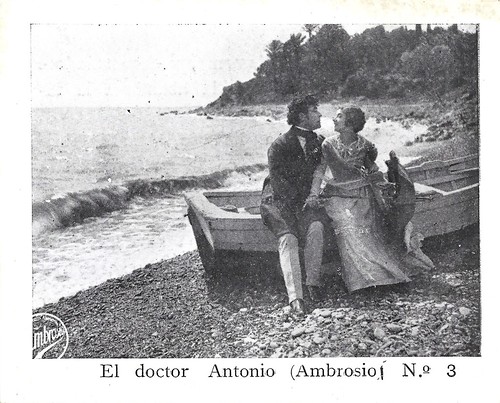
Spanish collectors card by Reclam Films, Mallorca, no. 3 of 6. Photo: Ambrosio Film. Fernanda Negri Pouget as Lucy and Hamilton Revelle in Il dottor Antonio/Doctor Antonio (Eleuterio Rodolfi, 1914).
The Ambrosio production Il dottor Antonio/Doctor Antonio (Eleuterio Rodolfi, 1914) was based on a novel by Giovanni Ruffini. The plot is set in the mid-19th century and deals with an Italian revolutionary (Hamilton Revelle) who falls in love with a wealthy young Englishwoman, Lucy (Fernanda Negri Pouget).
While Sir John and his daughter Luct are going to Genoa, the coach is overturned. Lucy breaks a bone and is cured by the young doctor Antonio di Bordighera. The healing goes well and the two young people fall in love, but Sir John and Lucy's brother disapprove of the possible union with an Italian and a revolutionary.
Heartbroken, the couple has to part and the Britons go home. Years after, Lucy cannot forget Antonio and returns to Italy but it is 1848 now, the year of the Revolution and the doctor fights on the barricades...
Antonio is caught and imprisoned in Ischia. Lucy follows him and even gets him released but he refuses to abandon his comrades. Lucy takes a house in Ischia and continues communicating with Antonio by lighting a lamp before the window every night. Yet, one bad day the lamp remains extinguished. Lucy had died out of desperation for love.
As far as we know, no print of Il dottor Antonio/Doctor Antonio (Eleuterio Rodolfi, 1914) still exists.

Spanish collectors card by Reclam Films, Mallorca, no. 4 of 6. Photo: Ambrosio Film. Fernanda Negri Pouget as Lucy in Il dottor Antonio/Doctor Antonio (Eleuterio Rodolfi, 1914). The man can be Hamilton Revelle.
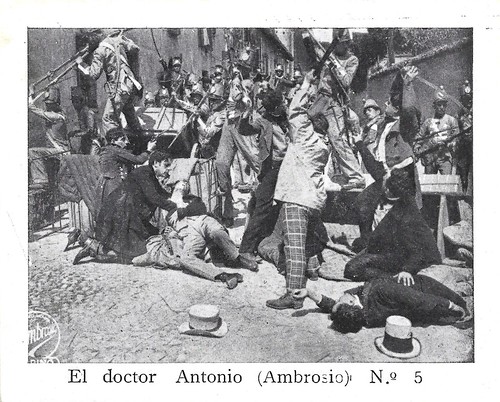
Spanish collectors card by Reclam Films, Mallorca, no. 5 of 6. Photo: Ambrosio Film. Revolution in Il dottor Antonio/Doctor Antonio (Eleuterio Rodolfi, 1914).

Spanish collectors card by Reclam Films, Mallorca, no. 6 of 6. Photo: Ambrosio Film. Fernanda Negri Pouget as Lucy in Il dottor Antonio/Doctor Antonio (Eleuterio Rodolfi, 1914).
Scuola d'eroi (1914)
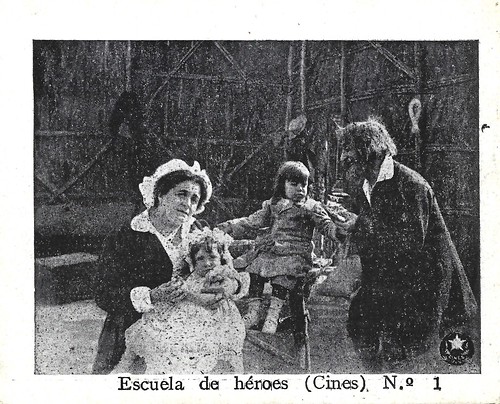
Spanish collectors card by Reclam Films, Mallorca, no. 1 of 6. Photo: Cines. Scene from Scuola d'eroi/ For Napoleon and France (Enrico Guazzoni, 1914). The Larose couple, old farmers, take care of the presumably orphaned children Rina and Carlo after their mother dies. Mrs. Larose is played by Ida Carloni Talli.

Spanish collectors card by Reclam Films, Mallorca, no. 2 of 6. Photo: Cines. Scene from Scuola d'eroi/For Napoleon and France (Enrico Guazzoni, 1914). Here we probably see Achille Majeroni as Captain, later Marshall Larive.

Spanish collectors card by Reclam Films, Mallorca, no. 3 of 6. Photo: Cines. Scene from Scuola d'eroi/For Napoleon and France (Enrico Guazzoni, 1914), starring Amleto Novelli and Gianna Terribili Gonzales. The man on the right could be Achille Majeroni, who plays Larive, captain and alter marshall in the army of Bonaparte.
Scuola d'eroi/For Napoleon and France (Enrico Guazzoni, 1914), with cinematography by Alessandro Bona, had its first screening in Rome in April 1914. The film starts with Captain Larive (Achille Majeroni) receiving orders to join his company in Corsica to fight the insurgent islanders. He leaves behind his children Carlo and Rina and his wife, who settle down with an aunt. The small, defenseless family undertakes the journey by stagecoach, unaware of the sad fate reserved for them. The reaction to '89 was in its full force and the Vendée in particular was more infested than ever with civil war. The stagecoach is attacked and poor Madame Larive is killed by fright, while the two children are abandoned in a wood. Their sobbing attracts the attention of Papa and Mama Larose, old farmers from the surrounding area, who were in the woods chopping wood. The Laroses pick up the two abandoned children and take them with them, thinking of adopting them. The children find the love of a new family by the hearth of the good, old couple. Meanwhile, the old aunt who was waiting for Madame Larive, alarmed by the delay and foreboding misfortune, writes to Captain Larive telling him of her fears. The captain hands over his company and departs. He finds the house empty and in great despair undertakes a feverish search, to no avail.
The young General Bonaparte (Carlo Cattaneo) has descended into Italy over the Great St. Bernard Pass and awaits the arrival of the Allies. Captain Larive is also called to join the army of Italy and in forced stages reaches the army at the camp of Montenotte. The clash is violent but the French troops drive the enemy away. Captain Larive, unconcerned about death, stands out among the braves and is seriously wounded. Bonaparte from far away witnessed the captain's heroism and, as he passes him on a stretcher, he shouts: 'Bravo! I will remember you!!!" Ten years pass. In the pure air of the fields, Captain Larive's children have grown robust and happy. France fights to subjugate the world and the Napoleonic eagle soars proudly in the skies of conquests and yearns for more. The Fatherland needs soldiers and Charles too feels his blood quivering at the call of war. He runs away from home and manages to enlist as a drummer in a regiment of Grenadiers. At Larose's house, the poor old man and his sister anxiously survey the street to see if the fugitive will ever return. They see him arrive proud and strutting in his new uniform; he has returned to greet them: they enter the Campaign. They parade, towards new glories, the regiments in front of Napoleon, surrounded by the throng of his marshals: among them is Captain Larive. The emperor remembered him. From his headquarters, in a small country house, Napoleon launches cavalry patrols to scout. The vanguard is heavily engaged. The battalion, where Charles is drummer, is among the first. The enemy lead mows down his ranks, but the grenadiers rush to the assault. At the decisive moment, the little drummer beats the charge, he is wounded, falls, gets up and the roll of his drum incites victory. His strength fails him, but he does not give up, he still beats desperately. The grenadiers win and come to a halt behind the enemy's flight. All-seeing Napoleon has seen and does not forget. While visiting a hospital he finds the little drummer lying wounded in a bed, approaches him and decorates him with a medal. To Charles it seems like a dream, his eyes radiate and he follows the Emperor full of gratitude.
Eight years later, Carlo (Amleto Novelli) is a cavalry officer and is happy thinking of his adoptive mother and sister (Pina Menichelli) to whom he has provided all the comforts of life. He, who is much sought after in the great world, meets the beautiful Madame de Longueville (Gianna Terribili Gonzales), who immediately feels a blind passion for him. The Count d'Elleuse (Raphael Vinci), the worshipper of the beautiful lady, is filled with jealousy at this newcomer in her heart and at the great fortune that is coming his way. Charles intervenes at the moment when the count is torturing Madame de Longueville with his jealousy, drives him away and sends him a challenge. The Count d'Elleuse refuses to fight, hatching in his breast the vilest revenge. The good Rina soon realises the danger to her brother from this amorous liaison but is unable to make him desist from it. France is preparing for a new war and every soldier must go to his battle station. Captain Charles takes leave of his lover, who tries by all means not to let him leave. His brave sister is on the alert and arrives just in the nick of time to call him back to the path of duty and honour. Revenge and love disturb the heart of Madame de Longueville, who cannot resign herself to the loss of the man she loves and hates. She attempts a last effort to win him over and succeeds in vain: all she has left is vengeance.
Rina, her brother's guardian angel, has become a sutler to follow Charles every step of the way because she always fears the fatal influence of Madame de Longueville. Napoleon needs a volunteer for a dangerous mission, our hero nobly offers himself and is chosen for this purpose. Madame de Longueville, in agreement with the Count d'Elleuse, perfidiously prepares a trap: she writes to Charles that she is dying and wishes to embrace him for the last time. The young man sets off on his mission and in front of the Château de Chavreuse, his heart cannot bear the thought of not fulfilling a dying woman's last wish. He decides to go up to greet her and then immediately go on his way to fulfill the requested task. He lets himself be introduced to the lady and on seeing her alive and well cannot hold back a cry of indignation: "What? You lied to me??" He is about to turn away in disgust when he is attacked from behind, bound solidly and locked up in a castle tower. Rina meanwhile is very worried that two days have passed and her brother has not returned to camp. A strong premonition suggests to her that he may be at Chavreuse Castle, having fallen under the laces of Madame de Longueville. She sees Charles behind the bars of a cell, shouts to him to give her the message he has not delivered and she runs to carry out the mission for him. The brave girl is chased along the road by enemy riflemen and is wounded, but she proudly returns to camp. The disheartened and disgraced Charles manages to escape with the help of an old butler. The young captain is referred to a war council, which must judge him if he is a deserter.
Marshal Larive presides as judge. It is to him that Rina introduces herself and pleads for her brother's fate. She narrates their entire life. The marshal then has the intuition and later the certainty that he has found his missing children. His duty as a soldier calls him to judge a deserter: the penalty is the death sentence, but his love as a father cannot make him sign the death sentence for his own son. In vain Rina begs for forgiveness from the One who can give life and death. Napoleon rewards her for her valour but reminds the father of his duties as a judge. The sentence is signed. It is the livid dawn of the day of execution, the young man sets out to atone for his foul deed, and his father is present. But the Emperor is also on the spot: with an abrupt gesture, he tears up the sentence and says to Charles: "Go... embrace your father!!! If you must die... die for me!..." And like last time as a little drummer boy, Captain Larive launches the victorious charge and with magnificent heroism plants the imperial insignia on the enemy trench. Behind the flight of the enemy, the cry breaks out frantically: "Long live the Emperor!"
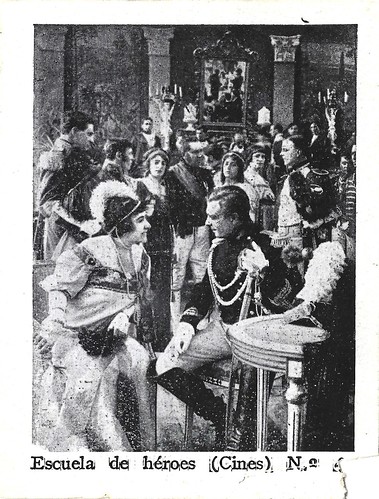
Spanish collectors card by Reclam Films, Mallorca, no. 4 of 6. Photo: Cines. Scene from Scuola d'eroi/For Napoleon and France (Enrico Guazzoni, 1914), starring Amleto Novelli and Gianna Terribili Gonzales.
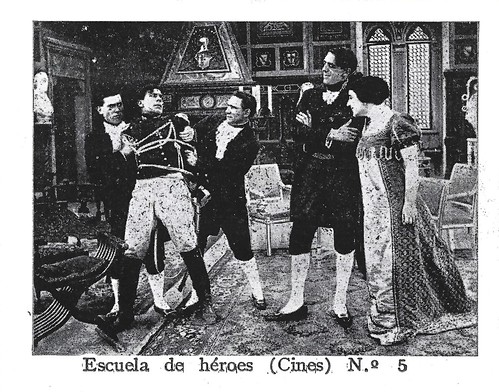
Spanish collectors card by Reclam Films, Mallorca, no. 5 of 6. Photo: Cines. Scene from Scuola d'eroi/For Napoleon and France (Enrico Guazzoni, 1914), starring Amleto Novelli and Gianna Terribili Gonzales. The man on the right is Raffaele Vinci, who plays Novelli's rival.

Spanish collectors card by Reclam Films, Mallorca, no. 6 of 6. Photo: Cines. Scene from Scuola d'eroi/For Napoleon and France (Enrico Guazzoni, 1914), starring Amleto Novelli and Gianna Terribili Gonzales. Both stars are visible while Novelli holds Pina Menichelli, who plays the sister of his character.
Torquato Tasso (1914)
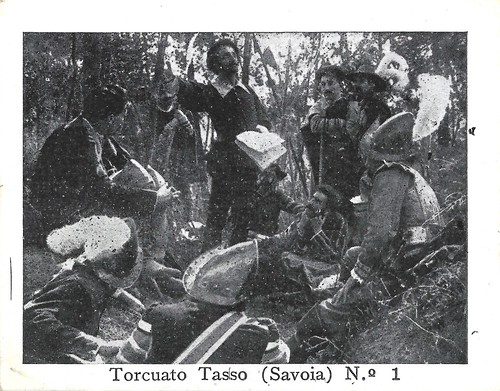
Spanish collectors card by Reclam Films, Mallorca, no. 1 of 6. Photo: Savoia Film. Scene from Torquato Tasso (Roberto Danesi, 1914), starring Mario Roncoroni as the famous 16th-century writer and poet Torquato Tasso (1544-1595). The Spanish release title was Torcuato Tasso. Here Tasso recites his verses before soldiers and brigands.

Spanish collectors card by Reclam Films, Mallorca, no. 2 of 6. Photo: Savoia Film. Scene from Torquato Tasso (Roberto Danesi, 1914), starring Mario Roncoroni as the famous 16th-century writer and poet. The card depicts a scene from 'Gerusalemme Liberata', Tasso's most famous work. It might be a scene with the Christian knight Rinaldo and the witch Armida, a tale that partly mixes the stories of Odysseus and both Circe and Calypso.

Spanish collectors card by Reclam Films, Mallorca, no. 3 of 6. Photo: Savoia Film. Scene from Torquato Tasso (Roberto Danesi, 1914), starring Mario Roncoroni as the famous 16th-century writer and poet. The Spanish release title was Torcuato Tasso. This card shows an awkward moment at the court of Ferrara.
Torquato Tasso (Roberto Danesi, 1914) is a silent Italian biopic on the famous 16th-century writer and poet Torquato Tasso (1544-1595), produced by Savoia Film. Tasso is known for his 1591 poem 'Gerusalemme Liberata' (Jerusalem Delivered), in which he depicts a highly imaginative version of the combats between Christians and Muslims at the end of the First Crusade, during the Siege of Jerusalem of 1099. Tasso's work was widely translated and adapted, and until the beginning of the 20th century, he remained one of the most widely-read poets in Europe.
The film narrates a series of episodes in the life of Tasso at the court of the d'Estes in Ferrara: his love of Duchess Eleonora d'Este, the sister of Duke Alfonso d'Este; the jealousy of the rejected lady-in-waiting, Countess Eleonora Scandiano, and her revenge; Tasso's dramatic imprisonment; his flight from the castle in a boat to the countryside, where brigands recite the verses of his poem 'Gerusalemme Liberata'; and his final years in Rome. Up until the time of the film, many sources, including Donizetti's opera, mention the - unproved - love triangle between Tasso and the two Eleonoras. The film contains several excerpts depicting two of Tasso’s works, 'L’Aminta' and 'La Gerusalemme Liberata', made on purpose for this production.
Today, director Roberto Danesi is better known as the co-director of the famous lost film Sperduti nel buio/Lost in Darkness (Nino Martoglio, Roberto Danesi, 1914). He died one year after in the First World War. Leading man Marco Roncoroni would later become the co-director of the film La nave/The Ship (Gabriellino D'Annunzio, Mario Roncoroni, 1921). While it is unknown who the two main actresses were, one of the male co-actors was Sigurd Trier.
Exteriors for Torquato Tasso were shot at the original places where Tasso lived: the castle and the lunatic asylum in Ferrara, and the real church of Sant’Onofrio al Gianicolo in Rome where Tasso spent his last years.
At the time, the film had mixed reviews: the drama was praised but the journal La Vita Cinematografica thought too much attention was given to close-ups as well as to the curves of the female rival, Countess Eleonora Scandiano. A print of the film was recently found at and restored by the Gosfilmofond archives in Moscow. An earlier film version of Tasso's life was already made five years earlier by Ambrosio, Torquato Tassi (Luigi Maggi, 1909). An incomplete copy of Cines' La Gerusalemme liberata (1910) was also recently found and restored in Moscow.
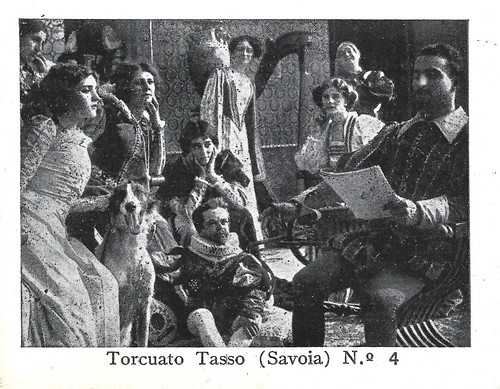
Spanish collectors card by Reclam Films, Mallorca, no. 4 of 6. Photo: Savoia Film. Scene from Torquato Tasso (Roberto Danesi, 1914), starring Mario Roncoroni as the famous 16th-century writer and poet. Here Tasso recites his verses to the court of the Duchess d'Este at Ferrara.
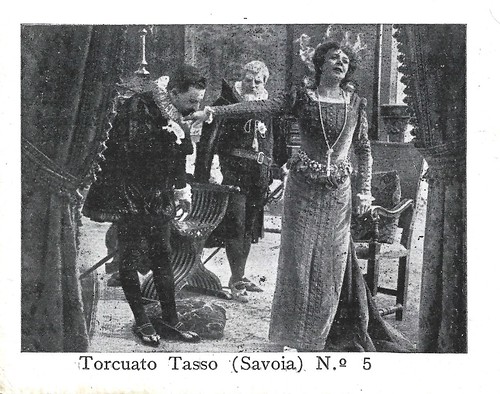
Spanish collectors card by Reclam Films, Mallorca, no. 5 of 6. Photo: Savoia Film. Scene from Torquato Tasso (Roberto Danesi, 1914), starring Mario Roncoroni as the famous 16th-century writer and poet. Here Tasso kisses the hand of Countess Eleonora Scandio, even if his true love is Duchess Eleonora d'Este.

Spanish collectors card by Reclam Films, Mallorca, no. 6 of 6. Photo: Savoia Film. Scene from Torquato Tasso (Roberto Danesi, 1914), starring Mario Roncoroni as the famous 16th-century writer and poet. This card depicts a scene from Tasso's most famous work, 'Gerusalemme Liberata': the death of Clorinda, in the arms of Tancredi.
Sources: Vittorio Martinelli (Il cinema muto italiano, 1914, Vol. II - Italian), Sempre in penombra (Italian), Wikipedia and IMDb.
1 comment:
Than you for shedding light on forgotten Italian silent films. The detailed scenes offer a glimpse into the narratives and characters of each production, showcasing the rich history of early cinema. Also thanks to the film studio for preserving these glimpses of cinematic history.
Post a Comment